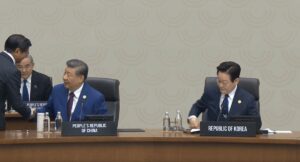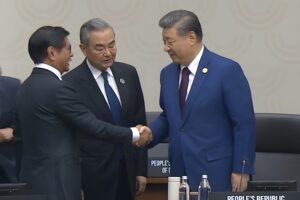BUSAN, South Korea – In the high-stakes theater of international diplomacy, sometimes the most telling moments are the shortest. At the close of the 32nd APEC Summit in Busan, South Korea, a brief handshake between Philippine President Ferdinand “Bongbong” Marcos Jr. and Chinese President Xi Jinping offered a snapshot of the complex, often contradictory relationship between Manila and Beijing. This seemingly simple act of courtesy was a deliberate diplomatic maneuver, executed against the backdrop of escalating maritime tensions that threaten to destabilize the region.
The interaction was less an impromptu friendly greeting and more a careful navigation of protocol and security, as Marcos himself recounted to the Philippine media delegation. His description of the moment was laced with characteristic candidness, revealing the guarded nature of high-level state interactions.

The Delicate Diplomatic Dance
President Marcos Jr. noted that the Chinese leader is perpetually shielded, traveling with an extensive security detail that makes casual approaches difficult. His humorous, yet revealing, assessment highlighted the underlying geopolitical distance separating the two leaders.
“The Chinese leader has always had his security personnel around him,” Marcos observed. He then shared a personal thought on his cautious approach: “I don’t want to insist since his security personnel might punch me.” This translated remark (“Ayoko namang mamilit baka suntukin pa ko ng security niya”) immediately became the headline, underscoring the delicate balance required of any diplomat approaching one of the world’s most powerful, and protected, figures.
Despite the barriers, Marcos successfully extended his hand to Xi, offering congratulations on China’s upcoming role as host of the APEC Summit next year. The Philippine President framed the action simply as adhering to the highest standards of international conduct. “It’s quite embarrassing that I haven’t extended my greetings yet,” Marcos said, concluding that the gesture was merely “common courtesy.”
In the world of diplomacy, however, common courtesy between two nations locked in a sovereign dispute is anything but common. It is a calculated move designed to keep the lines of communication open, preventing a freeze in relations even as geopolitical differences run deep.
The Weight of the West Philippine Sea
The gravity of the brief handshake is fully understood only when considering the context of the West Philippine Sea (WPS). This decades-long maritime dispute is the singular, most significant hurdle in the bilateral relationship between Manila and Beijing, constantly threatening to overshadow cooperation in other areas like trade and investment.
The Philippines asserts its sovereign rights over the WPS, which is the official name for the parts of the South China Sea that fall within Manila’s 200-nautical-mile Exclusive Economic Zone (EEZ), as recognized by the United Nations Convention on the Law of the Sea (UNCLOS). Crucially, a 2016 ruling by the Permanent Court of Arbitration in The Hague definitively invalidated China’s expansive claims.
However, Beijing continues to reject the ruling, asserting sovereignty over almost the entirety of the South China Sea through its controversial nine-dash line claim. The past few months have seen tensions rise sharply, marked by repeated, aggressive actions by Chinese vessels against Philippine coast guard and supply boats within Manila’s EEZ. These incidents include the use of water cannons and dangerous maneuvers that have damaged Philippine vessels and injured personnel.
President Marcos has adopted a policy of assertive transparency, utilizing media and diplomatic channels to publicly call out Chinese aggression while simultaneously affirming the Philippines’ commitment to protecting its territorial integrity. The encounter with Xi at APEC, therefore, served as an essential reminder that dialogue, however brief and tightly controlled, remains the only viable mechanism to de-escalate potential conflict.
APEC and ASEAN: Pushing for a Code of Conduct
Beyond the necessary civility, Marcos used the diplomatic setting to reiterate the Philippines’ strategic goals for regional security and stability.
A key focus of the Marcos administration’s foreign policy is the finalization of the Code of Conduct (COC) in the South China Sea. This proposed framework among ASEAN members and China is intended to create rules and mechanisms to prevent conflict and manage disputes in the contested waters. Despite years of negotiations, the process has consistently stalled, mainly due to differences over the scope and enforcement of the proposed code.
Marcos expressed renewed optimism for a breakthrough, linking the COC’s progress to the Philippines’ upcoming diplomatic role. On Tuesday, he stated his hope that the Code of Conduct would finally be concluded when the Philippines hosts the ASEAN Summits next year.
Furthermore, he underscored the Philippines’ proactive approach to achieving this goal by confirming his intention to exert all efforts to invite President Xi Jinping to Manila for the signing of the finalized COC. This is a monumental ambition—to not only conclude a long-awaited international agreement but to secure the attendance of the Chinese leader on Philippine soil for the ceremony, transforming a moment of tension into one of regional triumph.
This forward-looking agenda demonstrates Manila’s strategy: to use its platform within regional blocs like APEC and ASEAN to advance its national interests and push for multilateral solutions to bilateral problems.
Conclusion: Diplomacy in the Age of Contradiction

The handshake between President Marcos Jr. and President Xi Jinping at the APEC Summit was a micro-moment rich with meaning. It showcased Marcos’s pragmatic approach—balancing the need for personal diplomatic engagement with an unflinching awareness of the security and political risks involved.
It was an act of courtesy that belied a massive geopolitical divide. As the Philippines prepares to take the regional diplomatic stage by hosting the ASEAN Summits, the world will be watching to see if Marcos can convert that brief moment of personal civility into meaningful progress on the Code of Conduct, securing a more stable and predictable future for the West Philippine Sea.





